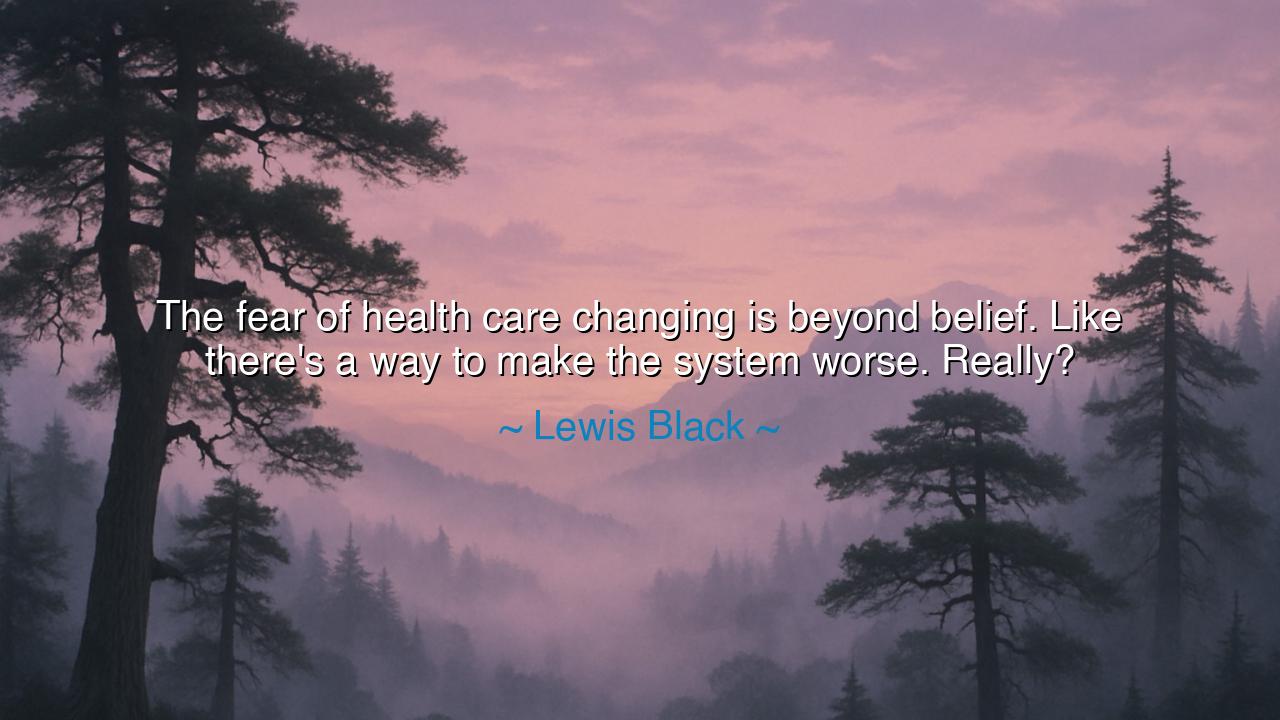
The fear of health care changing is beyond belief. Like there's a
The fear of health care changing is beyond belief. Like there's a way to make the system worse. Really?






“The fear of health care changing is beyond belief. Like there’s a way to make the system worse. Really?” – Lewis Black
In these sharp and piercing words, Lewis Black, the fiery satirist and truth-teller of our age, speaks as both jester and prophet. Beneath his humor burns a deep frustration, one born from love of country and disbelief at its contradictions. His tone, though comedic, is a cry from the heart — a challenge to the fear of change that paralyzes progress. When he mocks the resistance to reform in the health care system, he exposes a universal truth: that often, humanity clings to the broken simply because it fears the unknown. Black’s question — “Really?” — is both sarcastic and sacred. It is the question of every reformer in history who has faced the stubbornness of those content with suffering rather than daring to improve.
In ancient times, philosophers called this fear by many names. The Greeks spoke of apatheia — the paralysis of the soul that refuses to act even when wisdom demands it. The Romans saw it as a failure of virtus, the courage to rise above comfort for the sake of the greater good. Black’s words, in their modern form, carry the same spirit. He asks: How can one fear the change of something that is already broken? How can a people look upon inefficiency, suffering, and inequality in their own health systems, and yet tremble at the idea of trying something new? In his humor lies deep moral outrage — the righteous fire of one who cannot bear to see complacency dressed as prudence.
The health care system he speaks of, like so many systems of human design, is not merely a set of institutions but a reflection of a nation’s soul. It reveals how much value a society places upon compassion, accessibility, and fairness. To fear its change, when it already fails so many, is to fear justice itself. The ancients would have called this a sickness of the collective heart — the inability to envision a world better than one’s own. When Black scoffs at the notion that reform might “make it worse,” he reminds us that the refusal to change is itself a guarantee of decline. For in nature, stagnation is death; only growth brings life.
Consider the story of Florence Nightingale, who entered the dark halls of war hospitals where infection ran rampant and care was primitive. She was met not with welcome, but with resistance. The men in power feared her reforms — her insistence on cleanliness, order, and data — as threats to tradition. Yet she persisted, armed not with weapons, but with reason and compassion. The result was a revolution in medical care that saved countless lives. Her courage to confront fear with fact is the very spirit Lewis Black demands of us. For if Nightingale had bowed to fear of change, the world might still be drowning in the same preventable suffering.
Black’s words also strike at a deeper human paradox: that people often mistake familiarity for safety. To many, the existing order — no matter how unjust — feels less frightening than the unknown future. The same fear that kept sailors from crossing the seas or societies from abolishing tyranny also resists progress in health care. Yet history shows that every great improvement begins with discomfort. The ancients who built the first aqueducts or hospitals faced ridicule and doubt, but they acted anyway, knowing that to challenge stagnation is the price of evolution.
But beyond satire and critique, Lewis Black’s message carries hope — for within frustration lies faith that things can be better. His words imply belief in the power of human reason and compassion to rise above apathy. He calls upon his listeners not merely to laugh at the absurdity of fear, but to confront it, to recognize that the health of a nation depends on its willingness to change. To improve health care — or any system — is not just a political act, but a moral duty, an affirmation that no structure is sacred if it fails to serve the people it was made for.
Therefore, children of the future, remember this: fear is the enemy of progress, and cynicism is the rust that eats away at justice. When you see broken systems — whether in health, education, or governance — do not defend them out of habit. Ask the sacred question Black asks: “Really? Can it be worse than this?” Seek wisdom, but do not let the comfort of familiarity blind you to the need for reform. Embrace change as the natural law of growth, for even the body must heal by renewing its cells.
And so let Lewis Black’s words ring through the ages — both as humor and as truth. The fear of change is more dangerous than change itself, for it binds humanity to its wounds and calls its own suffering peace. To build a better world, we must dare to look at what is broken and say, with courage and clarity: it must not remain so. For only those who challenge what is will ever discover what could be.






AAdministratorAdministrator
Welcome, honored guests. Please leave a comment, we will respond soon